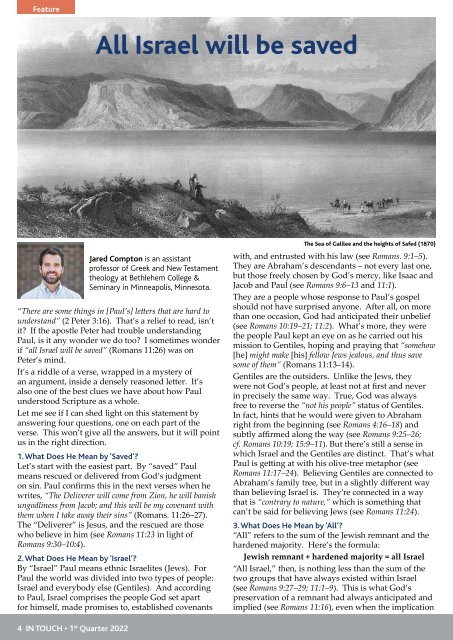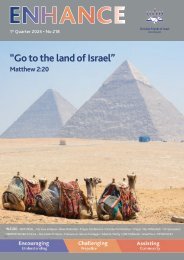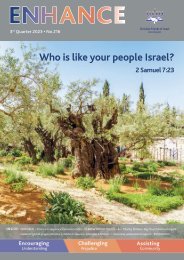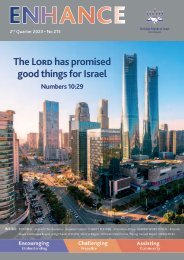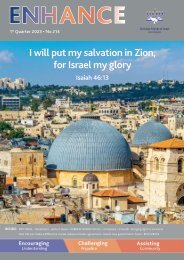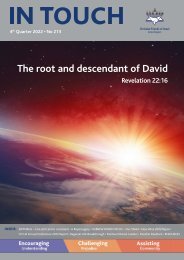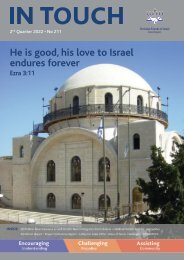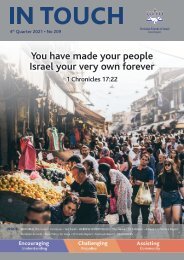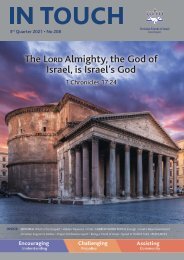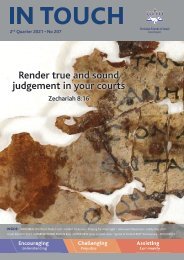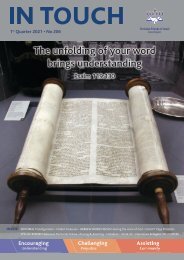In Touch - 1st Quarter 2022
Articles on: the continuing biblical story of the Line and the Land; restoring to wholeness (shalom); Christians in Israel; the Leica camera and the Jews; what the Apostle Paul meant when he wrote, 'all Israel will be saved'; the special story of one particular fiddle; CFI UK’s new Echoes of Sorrow exhibition; and Yair Lapid's aim to establish a coalition of nations opposed to a nuclear Iran.
Articles on: the continuing biblical story of the Line and the Land; restoring to wholeness (shalom); Christians in Israel; the Leica camera and the Jews; what the Apostle Paul meant when he wrote, 'all Israel will be saved'; the special story of one particular fiddle; CFI UK’s new Echoes of Sorrow exhibition; and Yair Lapid's aim to establish a coalition of nations opposed to a nuclear Iran.
- No tags were found...
You also want an ePaper? Increase the reach of your titles
YUMPU automatically turns print PDFs into web optimized ePapers that Google loves.
Feature<br />
All Israel will be saved<br />
Jared Compton is an assistant<br />
professor of Greek and New Testament<br />
theology at Bethlehem College &<br />
Seminary in Minneapolis, Minnesota.<br />
“There are some things in [Paul’s] letters that are hard to<br />
understand” (2 Peter 3:16). That’s a relief to read, isn’t<br />
it? If the apostle Peter had trouble understanding<br />
Paul, is it any wonder we do too? I sometimes wonder<br />
if “all Israel will be saved” (Romans 11:26) was on<br />
Peter’s mind.<br />
It’s a riddle of a verse, wrapped in a mystery of<br />
an argument, inside a densely reasoned letter. It’s<br />
also one of the best clues we have about how Paul<br />
understood Scripture as a whole.<br />
Let me see if I can shed light on this statement by<br />
answering four questions, one on each part of the<br />
verse. This won’t give all the answers, but it will point<br />
us in the right direction.<br />
1. What Does He Mean by ‘Saved’?<br />
Let’s start with the easiest part. By “saved” Paul<br />
means rescued or delivered from God’s judgment<br />
on sin. Paul confirms this in the next verses when he<br />
writes, “The Deliverer will come from Zion, he will banish<br />
ungodliness from Jacob; and this will be my covenant with<br />
them when I take away their sins” (Romans. 11:26–27).<br />
The “Deliverer” is Jesus, and the rescued are those<br />
who believe in him (see Romans 11:23 in light of<br />
Romans 9:30–10:4).<br />
2. What Does He Mean by ‘Israel’?<br />
By “Israel” Paul means ethnic Israelites (Jews). For<br />
Paul the world was divided into two types of people:<br />
Israel and everybody else (Gentiles). And according<br />
to Paul, Israel comprises the people God set apart<br />
for himself, made promises to, established covenants<br />
The Sea of Galilee and the heights of Safed (1870)<br />
with, and entrusted with his law (see Romans. 9:1–5).<br />
They are Abraham’s descendants – not every last one,<br />
but those freely chosen by God’s mercy, like Isaac and<br />
Jacob and Paul (see Romans 9:6–13 and 11:1).<br />
They are a people whose response to Paul’s gospel<br />
should not have surprised anyone. After all, on more<br />
than one occasion, God had anticipated their unbelief<br />
(see Romans 10:19–21; 11:2). What’s more, they were<br />
the people Paul kept an eye on as he carried out his<br />
mission to Gentiles, hoping and praying that “somehow<br />
[he] might make [his] fellow Jews jealous, and thus save<br />
some of them” (Romans 11:13–14).<br />
Gentiles are the outsiders. Unlike the Jews, they<br />
were not God’s people, at least not at first and never<br />
in precisely the same way. True, God was always<br />
free to reverse the “not his people” status of Gentiles.<br />
<strong>In</strong> fact, hints that he would were given to Abraham<br />
right from the beginning (see Romans 4:16–18) and<br />
subtly affirmed along the way (see Romans 9:25–26;<br />
cf. Romans 10:19; 15:9–11). But there’s still a sense in<br />
which Israel and the Gentiles are distinct. That’s what<br />
Paul is getting at with his olive-tree metaphor (see<br />
Romans 11:17–24). Believing Gentiles are connected to<br />
Abraham’s family tree, but in a slightly different way<br />
than believing Israel is. They’re connected in a way<br />
that is “contrary to nature,” which is something that<br />
can’t be said for believing Jews (see Romans 11:24).<br />
3. What Does He Mean by ‘All’?<br />
“All” refers to the sum of the Jewish remnant and the<br />
hardened majority. Here’s the formula:<br />
Jewish remnant + hardened majority = all Israel<br />
“All Israel,” then, is nothing less than the sum of the<br />
two groups that have always existed within Israel<br />
(see Romans 9:27–29; 11:1–9). This is what God’s<br />
preservation of a remnant had always anticipated and<br />
implied (see Romans 11:16), even when the implication<br />
4 IN TOUCH • 1 st <strong>Quarter</strong> <strong>2022</strong>


